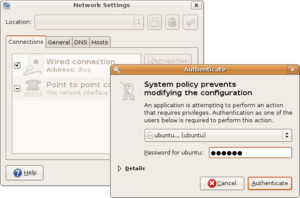Polkit
|
| |
| Developer(s) | David Zeuthen, Red Hat |
|---|---|
| Repository |
cgit |
| Written in | C |
| Operating system | Unix-like |
| Type | Privilege authorization |
| License | LGPL (free software) |
| Website |
www |

Polkit (formerly PolicyKit) is a component for controlling system-wide privileges in Unix-like operating systems. It provides an organized way for non-privileged processes to communicate with privileged ones. Polkit allows a level of control of centralized system policy. It is developed and maintained by David Zeuthen from Red Hat and hosted by the freedesktop.org project. It is published as free software under the terms of version 2 of the GNU Lesser General Public License.[1]
Since version 0.105,[2] the name of the project was changed from PolicyKit to polkit to emphasize that the system component was rewritten[3] and that the API was changed, breaking backward compatibility.[4]
Fedora was the first distribution to include PolicyKit, and it has since been used in other distributions including Ubuntu since version 8.04 and openSUSE since version 10.3. Some distributions, like Fedora,[5] have already switched to the rewritten polkit.
It is also possible to use polkit to execute commands with elevated privileges using the command pkexec followed by the command intended to be executed (with root permission).[6] However, it may be preferable to use sudo, as this command provides more flexibility and security, in addition to being easier to configure.[7]
See also
References
- ↑ "polkit Git COPYING". David Zeuthen. Retrieved 2012-11-15.
- ↑ "polkit Git NEWS". David Zeuthen. Retrieved 2012-11-15.
- ↑ "Chapter 9. PolicyKit". openSUSE Security Guide. Novell, Inc. and contributors. Retrieved 2012-11-15.
- ↑ "Polkit and KDE: let’s make the point of the situation". Retrieved 2012-11-15.
- ↑ "Features/PolicyKitOne". Fedora Project Wiki. Retrieved 2012-11-15.
- ↑ "pkexec". polkit Reference Manual. Retrieved 2013-05-25.
- ↑ "When to use pkexec vs. gksu/gksudo?". Retrieved 2013-05-25.
External links
| Wikimedia Commons has media related to Polkit. |
- polkit Home at freedesktop.org
- Documentation at freedesktop.org
- Why polkit explaining polkit's role in a modern system
